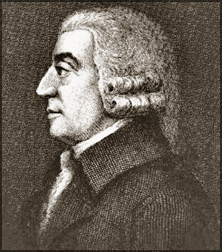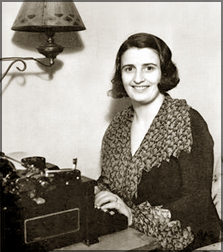|
Petrograd connection, planning and statecraft - Part
II:
Saving nations from financial raiders
Continued from yesterday
Wendell W Solomons
In consequence, the help of people like Glasgow Professor Adam Smith,
was enlisted. One task was to smooth ruffled feathers and restore the
majesty of the king and the loyalty of his ministers. Another task was
to protect the financiers and condemn Benjamin Franklin and supporters
everywhere of the competing debt-free currency as profane before the
Almighty, as follows.
The Wealth of Nations
 |
 |
|
Professor Adam Smith |
Ayn Rand |
The title of the 1776 Glasgow book, ‘The Wealth of Nations’ bears a
generic relationship to the controversy that Benjamin Franklin had
caused when he was asked about “the wealth of the colonies.” Smith’s
work was prepared after studying authors in Britain and abroad. It took
up many themes but most importantly for posterity, Smith rearranged
Bernard Mandeville’s “Fable of the Bees.”
This story had become famous in the 1724 edition of Mandeville’s book
where he drew an example from the bee collecting nectar to suggest that
“Private vices bring public benefit.” Sanitising and sanctifying the
theme, Smith gained fame with his proclamation of the Invisible Hand:
He announced that every individual in pursuing his or her own good is
led, as if by an invisible hand, to achieve the best for all. Therefore,
any interference with free competition by government is almost certain
to bring bad effects.
Adam Smith’s sanctification of Mandeville’s ‘private vice’ performed
three functions at the altar of London’s financial city:
(1) He soothed king and government - and helped towards a truce with
the rebels;
(2) Keeping from exposing the financiers’ motive of currency that
catalysed the loss of the American colonies, Smith left the financiers
to fight another day. They could rejuvenate by utilising other markets
(for instance, they switched Britain’s ‘free trade’ from cotton imports
from America to imports from Egypt);
(3) Using the concept ‘Invisible Hand’ Smith was creating a
hyper-real association with the benevolent hand of the Almighty. He had
contrived meaning for a Christian population, for comparison in this
context, not a Buddhist population.
Smith surmised that to expose the hand of finance capital, to let it
be seen as a plutocracy or oligarchy, would at the time, court rebellion
in the British mainland.
Economics moves through Petrograd to the Chicago Boys
On the other hand, despite job losses everywhere in the world today,
we don’t see rebellion on the boards. Does that mean sea change arose?
The fact of the matter is that Ayn Rand, the ideologue behind the
monetarists and long term associate of guru Milton Friedman (and also of
the USFed’s Alan Greenspan,) knew little of the balance of social forces
that caused Adam Smith’s ‘Invisible Hand’ concept.
She had arrived in the USA in 1926 from Bolshevik-era Petrograd where
the avid viewer of silent movies had found promise in studying Social
Pedagogy at University in Russia.
Her environment was such that in place of the concerns of Adam Smith,
she had immersed herself in nihilists who served up “Nothing Matters” to
soothe those professionals who dissented under the Tsar. Reflections on
nihilism are available in publications by Turgenev and other
contemporaries.
What is nihilism?
“However, if I may say so,” Nicholas Petrovich interjected, “you deny
everything or, to put it more precisely, you are destroying
everything.... But it’s essential to construct as well.” To which
Bazarov the Nihilist replied: “That is not our affair.... We must make a
clean sweep first.”
Ivan Turgenev in 1862 novel ‘Fathers and Sons’
The Anglo-American heritage and background to the ‘Invisible Hand’
axiom was left somewhere in the attic as Ayn Rand went on to preach her
doctrine of “God is I” (for no one else matters.) If we were to try to
give voice to her in relation to Adam Smith, her doctrine declares that
the “Invisible Hand is I”.
Scriptwriter
Her doctrine evokes self-adulation and self-promotion in the general
population when by calculation the first among equals, giant financial
groups such as Citibank, J P Morgan or Lehman Brothers, gain the lion’s
share. It is no level playing field.
Sensing new rules, fly-by-nights afflicted vulnerable populations
worldwide. In Sri Lanka, an English teacher used his popularity with TV
audiences to set up a finance company and then vanished into the night
with his depositors’ savings.
The scriptwriter for these events, Ayn Rand, was a first-generation
American. So was it for the parents of Milton Friedman and his frontline
Chicago Boys (Chicago University arose through the finance/oil
Rockefellers endowment.) In brief, we had aliens catapulted into
Anglo-American heritage with its historical bases in the Mayflower
Compact and the Magna Carta - and someone took them seriously.
It later became the task of others allied with big money to sponsor
media reviews and promote Ayn Rand’s work in paperback edition for sale
to campus students (otherwise the format is at odds with her opaque
prose.)
To be continued
|



